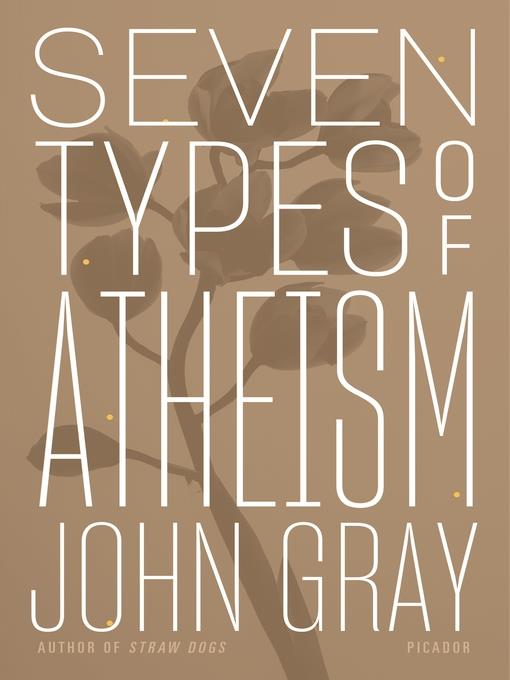
Seven Types of Atheism
کتاب های مرتبط
- اطلاعات
- نقد و بررسی
- دیدگاه کاربران
نقد و بررسی

Starred review from August 27, 2018
Reviewing the lives, principles, and practices of prominent and obscure atheists from centuries past, Gray (Straw Dogs) challenges the presuppositions and positions of contemporary atheists and secular liberals in this powerful book. By looking back at mystical atheists such as Meister Eckhart and Arthur Schopenhauer, or “God-haters” such as Fyodor Dostoyevsky and the Marquis de Sade (as well as movements such as monism, positivism, Nazism, and communism), Gray peels back the godless sheen to show that much of what is called “atheist” is actually quite religious. He argues that the only real difference between traditional conceptions of atheism and religion is that, in place of a monotheistic God, atheists found faith in humanity and its ability to improve as a species. Many of the examples Gray cites show a zealous commitment to humans “self-realizing” in the midst of history—whether through an uprising of the working class, technology, or Nietzschean Übermensch ethic. Gray sees this belief as just as far-fetched as that of a deity who spoke the world into being. Going after the sacred cows of atheism, Gray’s work is more of a polemic than it is pure explanation or historical overview. Although prone to some sweeping statements, Gray alluringly invites readers to reconsider what atheism is and should be.

September 15, 2018
A brief philosophy of irreligion for general readers, with a roll call of notable male atheists since antiquity.Gray (The Soul of the Marionette: A Short Inquiry into Human Freedom, 2015, etc.) has had it with what passes for atheism these days. Following his own schema of seven thematic types, each chapter gives an overview of historical trends in godless thinking, focusing on a few famous figures for closer inspection. Gray spoils any chance of a big reveal by admitting that only two of the seven types are worth our time. He does reveal his rhetorical motivation: not persuading others to abandon their bad faith in God but instead urging them to denounce and eradicate the "secular humanism that all evangelical atheists promote today." He faults this "new atheism" with underestimating the function of religious faith to the human psyche and, more alarmingly, with swapping belief in God for a suspiciously theistic devotion to flawed societal constructs like politics, human progress, and science. Citing the destructive potential of modern "political religions" like Bolshevism, the author remains skeptical that universal liberty is best for the future of humanity, claiming, "like Christianity, liberal values came into the world by chance." Gray spends some quality time with great literary atheists and intellects including Dostoyevsky, Nietzsche, and Conrad, but he reserves most respect for God-denying, life-affirming thinkers like George Santayana as well as for the strand of "mystical atheism" inspired by the writings of Arthur Schopenhauer. Gray's favorite type of atheism seeks out silence, meditation, and other rapturous states of being while insisting on the incomprehensibility of anything like a creator-god in control of human destiny. This tradition the author likens to apophatic theology like that practiced by Meister Eckhart, whereby no positive statements can describe the divine because it necessarily surpasses the bounds of human conception. With his openly partisan stance as his caveat emptor, Gray intends his capsule histories and philosophies to provoke dialogue among atheists, people of faith, and everybody else.An occasionally tedious but concise and well-researched overview.
COPYRIGHT(2018) Kirkus Reviews, ALL RIGHTS RESERVED.

September 1, 2018
Atheism, Gray avers, has many meanings, though in a sense it is simply the absence of the idea of a creator-god. As for religion, it is an attempt to find meaning in events, not a theory that tries to explain the universe. From these premises, as his title suggests, he extrapolates seven types of atheism. Always erudite and convincing, Gray is sometimes given to interesting categorical statements: William James' The Varieties of Religious Experience is the best book ever written on religion by a philosopher; atheists are better-educated in France than in English-speaking countries; some of Ayn Rand's arguments are thoroughly silly. He is inarguably a reliable guide through a thicket of famous names associated with atheism?Lenin, Marx, Conrad, and Hitler, among them?and he offers solid introductions to the work of lesser-known figures, including Jan Bockelson and Isaac La Peyr�re. In addressing his subjects, Gray takes deep dives into history, examining the evolution of ideas in a generally accessible way. A valuable examination of one of the many fascinating junctures where religion and philosophy meet.(Reprinted with permission of Booklist, copyright 2018, American Library Association.)

























دیدگاه کاربران